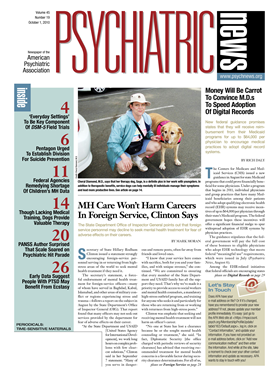In the August 8 issue, Dr. Louise Mullan, a member-in-training Assembly representative, protested how the Appelbaum work group report and recommendations on “ethics guidelines regarding the relationships of psychiatrists with the pharmaceutical industry” (recommendations similar to those of the Institute of Medicine, Association of American Medical Colleges, Council of Medical Specialty Societies, and proposed guidelines sent by AMA to its Council on Ethical and Judicial Affairs) should have been discussed, debated, and negotiated in an open plenary session at last May's Assembly meeting but was sent to a reference committee where it “died” and where “attempts to have a discussion thereafter were stymied.”
I, at the other end of the age spectrum as an APA Lifer, have had similar difficulties, but I have seen more in my time. My November 2008 action paper to require candidates at the national level to disclose potential conflicts of interest in their statements appearing in Psychiatric News and accompanying the ballot was passed unanimously (consent calendar) by the Assembly, went to a work group of the Board, and nothing was heard of it after that. Repeated attempts to find out what and why, including my questioning Dr. Carol Bernstein, then president-elect and chair of the work group and now president, at the Assembly have similarly gotten nowhere.
The disclosure requirement requested in the Assembly action paper is the same that we ask and have asked for years of those appointed to councils, committees, task forces, and work groups (including DSM and practice guidelines), and other components; those who present at CME and other professional meetings; and those who contribute to journals.
Other organizations ask for these things, and there clearly are no legal problems. What is the problem? Why is it handled this way in the upper reaches of APA governance?
HERBERT PEYSER, M.D.
Assembly Representative
New York County District Branch
Response from APA President Carol Bernstein, M.D.: Dr. Peyser's Assembly action paper was referred to APA's Joint Reference Committee, which referred it to the Ad Hoc Work Group on Disclosures and Interests Policies. That group, which I chaired, took it under advisement but did not move forward on Dr. Peyser's suggestions after obtaining guidance from APA counsel. It continues to be APA policy that the information provided on APA disclosure forms is confidential and that open access to those documents is restricted. However, candidates in APA's annual election are asked to indicate their primary professional activities and the percentage of income derived from those activities for publication in the
Psychiatric News election issue and for posting on the Internet. I strongly recommend that any APA member who has questions about a candidate's potential conflicts of interest or disclosures contact the candidate directly if more information is desired.

